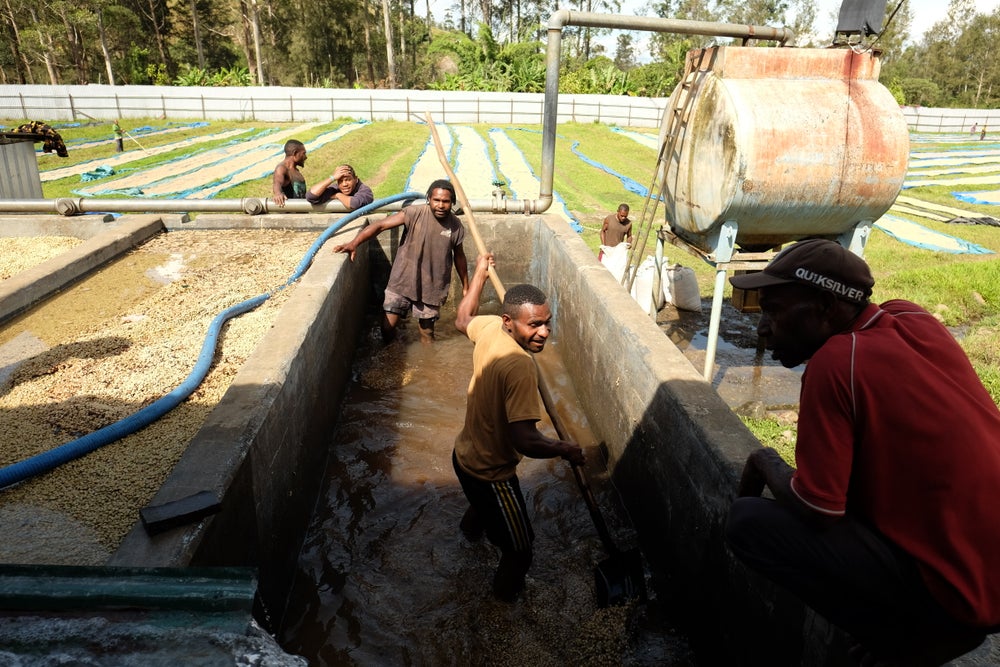From the Field, New Arrivals
Monday, July 27, 2020
Exceeding Expectations with PNG Specialty Coffee
“Coffee production in Papua New Guinea (PNG) is utterly unique. There’s no exact comparison to other producing countries. PNG is just PNG,” says Tim Heinze, Sucafina’s PNG Director. When Tim talks about PNG, his enthusiasm for the beauty of its people and landscape is immediately apparent. “PNG is a gem. The unique and special coffees grown across the country’s widely diverse landscape showcase the rich culture and lives of those who grow it.”

PNG has long been overlooked as a specialty coffee supplier, but Sucafina Specialty PNG, with Tim and an amazing group of local team members and partners pushing forward, is determined to change all of that. “People are understandably cautious about PNG because of quality issues they might’ve experienced in the past. Sucafina PNG is already making huge strides helping farmers improve their quality and consistency,” Tim explains. “We’re investing in and adding to the supply chain. We’re able to bring our knowledge of agricultural innovations and quality control to help farmers realize PNG’s true potential as a specialty coffee producer.”
Tim was eager to dispel any remaining myths about PNG coffees and share his firsthand experience of PNG cupping profiles.
“Like any origin, you can find a wide range of quality and complexity in PNG,” Tim says. “Y-grade is a well-known commercial blender. This kind of coffee has a citric core acidity and is kind of nutty with a mid-level body. It provides a nice foundation for a blend.”
The next quality level is currently called Premium Smallholder Coffee (PSC). Tim explains that the grading system is changing and this may have a different name in the future, but the profile—a bit more complex with a cleaner cup than Y grade showcasing more almond, brown sugar, and complex acidity—will remain fairly similar. “With PSC and above, you can start to see regional differences in taste,” Tim says.
The typical PNG grading scale includes 3 broad categories—Y grade, PSC and Plantation-grade—but Sucafina PNG, in pursuit of a wide range of consistent flavors and qualities that roasters can rely on year after year, has added 2 additional quality options: Lamari and Tairora.
“More options means more opportunities to identify and highlight excellent suppliers and flavor profiles. It also means that farmers, especially smallholders, have more opportunities to increase their income and build long-term relationships,” Tim says.
He explains that, previously, smallholders were restricted to the option of selling their dried coffee as either Y grade or PSC to local companies or selling their cherry to a local washing station and forgoing traceability. The highest quality, Plantation-grade, would typically come from large-scale farms, which excluded smallholders from opportunities for specialty coffee premiums.
“With Sucafina’s blends, we’ve expanded opportunities and incentives for farmers focusing on quality and sustainability in production,” Tim says.
Lamari is a traceable, regional coffee grown by smallholders in the Lamari River Valley. “Lamari is sweeter, and has more floral notes, with a wider variety of fruit notes, including stone fruits,” Tim says.
Next are plantation-grade coffees, which are traceable to single estates. “These profiles tend to have more complexity of aroma and flavor with complex fruit flavors and layered acidities. Plantation-grade coffees frequently make excellent single-origin selections,” Tim says.
Sucafina’s Tairora blend is a regional blend that Baroida wet mill buys as cherry from local farmers. “Our partner, Baroida, does a great job of maintaining lot traceability,” Tim says. “Tairora ranks among the specialty-level coffees that can confidently hold their own as single-origin offerings thanks to their exciting profiles alight with florals, sweetness, spices, complex acidities, well-balanced bodies and more.”
In addition to working with Baroida wet mill to source our regional smallholder blend, Tairora, we also purchase lots grown and processed at Baroida Estate. Baroida Estate was a forerunner in coffee cultivation in Eastern Highlands and continues to be a leader in agricultural innovation and education. Whereas most coffee produced in PNG is Fully washed, Baroida also produces Natural and Honey lots. Their coffees are an ode to the variety and potential of PNG coffees: sweet, packed with florals, vanilla and spices, balanced bodies and complex acidities.
Sucafina PNG plans to bring internationally accredited training programs, including those from Coffee Quality Institute (CQI), to farmers in PNG. “Our plan is to invest in the long-term development of capacity building and knowledge. We can bring educational courses to, quite literally, peoples’ backyards,” Tim, himself a CQI instructor, says.